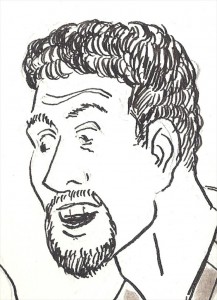
David Shayne writes for television and is a proud member of the Usual Gang of Idiots at MAD Magazine. If anyone wants to invite him to play basketball at the Supreme Court’s court, he will bring his dress shoes. (drawn by the late MADman, Dave Berg.)
During my junior year at Columbia, I began to think about my post-college life and wrestled with a decision so many other privileged, Jewish Ivy Leaguers before me had faced: Lawyer or comedy writer? I hedged my bets by taking a poli sci class on the history of the Supreme Court, followed by a summer internship at MAD Magazine.
The course was fantastic — a survey of the Court’s greatest hits (or, in the case of Dred Scott, its lowest moments). We read decisions and dissents and discussed them in depth. We were also assigned Bob Woodward and Scott Armstrong’s 1979 best-seller The Brethren, a self-described “account of the inner workings of the Supreme Court from 1969 to 1976” in which Woodward and Armstrong interviewed more than 200 people, from former clerks and Court employees to several Justices. They approached the endeavor as two laypeople with no expert legal knowledge who hoped to understand the complete process as Court cases go from the granting of cert all the way to the final decisions and dissents.
I had taken an overly ambitious courseload and had to triage — reading only what I was absolutely sure was going to be on the exam (the chapters on Roe v. Wade). So that summer, during my MAD lunch hour, I sat under the AT&T building on Madison Ave. and read The Brethren. I devoured the book, and it changed my view of the Court forever. Up until then, I had imagined the Supreme Court Justices as black-robed legal gods on Judicial Olympus who didn’t so much write their decisions as bestow them. But the book painted them as mortals, men (it was only men then) who wrestled with their decisions, argued, bickered, made jokes and relied on their clerks to help them manage their enormous workloads. (Made me feel a little better about my own aforementioned reading triage.) It was certainly gossipy in spots, with plenty of details on the sausage-making, and the end result was that it made the Justices human.
Hack basketball player that I am, my favorite parts were the stories of the clerks blowing off steam in the middle of the long work day by squeezing in a game or two of hoops on the Court’s fourth-floor basketball court. Best detail: Even though street shoes weren’t allowed, the clerks tried to get in just a little more game time by playing in them anyway… at least until Rehnquist saw to it the ban was strictly enforced. Sure, he was making decisions that would affect American life for decades to come — from the Pentagon Papers to the Nixon tapes — but he still found the time to be a major buzzkill.
As much as I enjoyed it, The Brethren didn’t inspire me to go into law. Maybe the thought of being so crunched for time in my professional life that I’d have to play basketball in wingtips was what finally pushed me into comedy. I parlayed that MAD internship — a comedy clerkship of sorts — into a job as Associate Editor, eventually moving to Hollywood to write for TV. But The Brethren did turn me into a Supreme Court junkie who each spring eagerly awaits the Court’s latest decisions. I have crushes on Nina Tottenberg and Linda Greenhouse. And I bore the writer’s room with a long-winded, faux-authoritative explanation of not just the importance of National Federation of Independent Business v. Sebelius as it affects public policy, but how in that case Roberts’ decision to switch from the conservative majority and uphold Obamacare was, in and of itself, a huge story.
Then we get back to making fart jokes.
Still, every now and then I wonder what would have happened if I had taken the legal path. Maybe I would’ve landed a clerkship on the Supreme Court. Maybe I would’ve helped some of our greatest legal scholars — and Scalia — wrestle with the most gripping Constitutional issues facing our nation.
And maybe I would’ve gotten to shoot hoops on the fourth floor.









